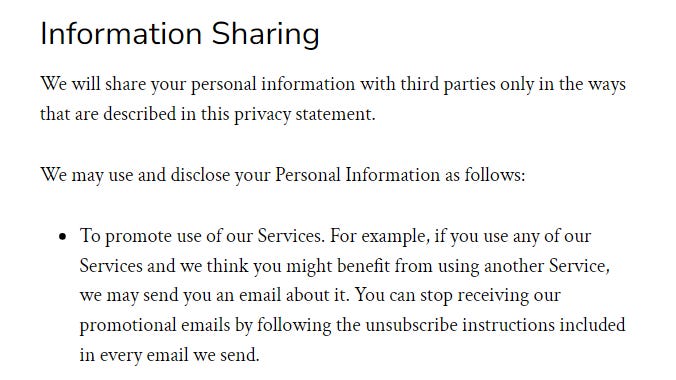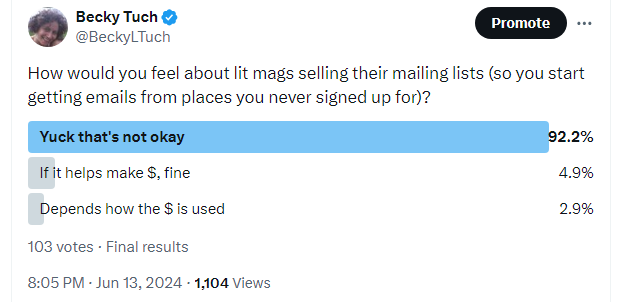Is this company using lit mags to collect and sell our data?
"Privacy. That must be nice." **
Welcome to our weekend conversation!
Many of us may not have a grasp on concepts like “cookies,” “data harvesting,” “data brokers,” “data aggregation for sale to third parties,” and things like that.
Personally, I am only just starting to get a handle on these things. Learning about all this requires work. It requires looking past the surface of things—the immediate gratification gained from clicking on content, liking posts, accessing articles, getting a service, and so on. It requires reading fine print, and fine print is usually small, hidden, and boring.
Sometimes, though, it pays to read the fine print. Particularly when you have questions about how a business is operating.
I’ve had questions related to a certain group of lit mags for some time. Before I say more, I want to be very clear: What I am about to discuss is in no way intended to cast a shadow upon the writers whose work appears in these journals. My observations here ought to have no bearing whatsoever on the works published, which I know are hard-won victories and well-deserved.
Nor do I wish to disparage the work of the editors, readers, staff and faculty involved in putting these magazines and workshops together. I think it’s perfectly possible for people to work at a magazine, produce a beautiful product, and have no knowledge of the larger picture in which they are playing a part. And what even is that larger picture? Maybe it’s nothing at all.
Together, let’s find out.
This weekend I want to talk about Discover New Art, LLC. According to its website,
Discover New Art is a growing, dynamic group of literary platforms that seeks to support and celebrate contemporary writers. We thoughtfully and carefully consider innovative ways to better serve literary artists. We are passionate about sharing our knowledge, and we are committed to helping others succeed.
The site states DNA was founded in 2011, though this public record lists it as founded in 2019. Perhaps 2019 is the year it became an LLC. The public record lists its Registered Agent is Scott Segal.
Who is Scott Segal? From what I can tell, he has no public identity with any connection to the arts. Search results brought up a personal injury lawyer, a doctor, a real estate agent, etc. Well, fine. It’s hard to know what to make of this. Maybe the LLC is simply registered under a different name for tax purposes. We can put Scott Segal aside and come back to him later.
Now let’s dig into the company itself.
The “dynamic group of literary platforms” are the lit mags, services and programs which operate under DNA. These lit mags are Masters Review, Frontier Poetry, Palette Poetry, CRAFT, Fractured Lit and Uncharted. It also includes Pocket MFA, “a fresh approach to writing education that prioritizes accessibility and community” and Literistic, “an exhaustive list of deadlines for submissions.”
At the bottom of all these journals’ pages, (except for Masters Review) you will find their Terms & Conditions and Privacy Policy. Most lit mags do not have such sections. If a lit mag does have a privacy policy, it’s typically short.
By contrast, take a look at the Terms & Conditions from Palette Poetry. I had to make the font teeny to include it all.
A bit long for a lit mag, huh?
Well, okay. You could say it’s just detailed. This is through a company, after all, and perhaps they’re just being exceptionally careful.
Here’s the thing about companies though. Typically, they exist in order to make money. If a company wants to make money, lit mags are usually not a go-to investment.
How, we might reasonably wonder, does this company earn the money necessary to sustain these seven projects, give out generous contest prizes, and pay its editors and faculty?
Here are excerpts from the Privacy Policy for Palette Poetry:
And:
Let’s break all this down.
The first part of this privacy policy indicates that they have the right to email you about any “Service” that they think you might be interested in. That seems reasonable enough. Certainly it’s a bit annoying. In fact, according to her Linked In page, the Chief Operating Officer of DNA doesn’t much like this herself:
We’ll come back to her later.
For now, let’s agree that not many people like when they submit to a magazine or sign up for one newsletter, then get bombarded with emails from other services. But let’s also agree that this is pretty common, and not necessarily harmful. They have programs to promote, after all, and it can be expected that they would share our personal information internally.
What about sharing that information externally?
Later in the policy, they state that they may use information gathered in order to develop “‘tools and algorithms’ that help us prevent violations.” What does this mean? What sort of violations would they want to prevent?
For this you would have to comb through their Terms & Conditions. In section N. article c, it states that the writer must agree not to “submit material that is unlawful, obscene, defamatory, libelous, threatening, pornographic, harassing, hateful, racially or ethnically offensive, harmful to children, in violation of any third party’s rights or encourages conduct that would be considered a criminal offense, give rise to civil liability, violate any law, or is otherwise inappropriate.”
Yep, that’s right. You will not submit material that “is…inappropriate.”
Now, we know that lots of lit mags say that sort of thing. But do lots of lit mags also grant themselves permission to use your data in order to develop algorithms that can “prevent” such violations? What does this even mean? Who exactly will be developing these “tools and algorithms?” And with what information of ours? How will this information be gathered and to whom will it be given?
This brings us to the next part. They have the right to “aggregate information from your use of the Services and [share such] information with third parties.”
Here we may start to get uncomfortable. What third parties? Who are they sharing our information with? And in what capacity is this information being “shared”? When they say your personal information is being “shared,” do they actually mean sold? To whom are they selling our information? Data brokers? Advertisers?
If you’re wondering if this is standard practice, let’s compare the above privacy policy with that of Paris Review:
And here is Rattle’s:
See the difference?
Finally, what do we make of that last part from the DNA policy, that if there is a sale, acquisition, merger, whatever, your information will be transferred over to the new owner? You’ll be notified by an email or an announcement on their site. This statement seems standard and exists also on The Paris Review.
The difference is, The Paris Review is an entity we all recognize. How many of us even ever heard of Discover New Art, LLC? How many of us would notice if these magazines changed ownership from one company to another? Who among us would think to ask, I wonder who is now in charge of all that aggregated data that has been amassed from my engagement with these seven different literary platforms, and I wonder how that data is being used and possibly monetized?
Of course, for many of you this might not matter. This is life in the internet age, after all. Besides, these are quality journals that do a lot for writers. If selling our data—if that is indeed happening—helps them stay afloat, why is that a problem?
This brings me back to Scott Segal, Man of Mystery. Who is he? We don’t know.
For that matter, who are the people behind DNA? There are no names on the website at all.
The COO of Discover New Art is Chelsea D’Errico. Curiously, there is nothing other than a Linked In page for this person online, that I found. No articles about the launch of this awesome new company; no interviews; no announcements about all these great projects.
Why the anonymity? Why the quiet? Well, maybe she and Scott and whoever else run this thing are just private people.
Ah, yes. Privacy. That must be nice.
And that’s just the thing. The equation would appear to be terribly lopsided. Here we are looking for places to send our personal essays, poems and stories. Here they are, possibly monetizing and profiting off our engagement, which means our curiosity and ambitions.
We must interact with these spaces if we want to grow our careers as writers. Therefore, unless we read the fine print and think to disable certain forms of tracking on our browsers, offering up our data is a bargain we end up making in order to have careers. This data could include anything from our location, browsing history, reading time, clicks, and more, all which we do not even realize is being collected, aggregated, then possibly sold. It is a bargain most of us are not even aware we are making.
From what I gather, most people (including, it would seem, the COO of DNA herself!) do not even like their email address being sold to third parties.
At the very least, why have so much anonymity (websites without names, anonymous contact forms) and evade the human connection? Isn’t that what the arts is supposed to be all about?
Or is the arts in this case just another means to collect, track, profile, monitor and monetize?
In the meantime, my friends, if any of this is important to you, be sure to read the fine print. And keep in mind that the default setting will always keep you opted in.
You are not an extractive well to be mined. You’re a person. You have the choice to opt out.
** Note to readers: This article has been edited since its original version. The earlier version included some speculation about the identities of certain people named here. Ultimately I felt that speculation distracted from the issues at hand, and I chose to remove it.












This is quite concerning. I had a very bad interaction with CRAFT a while back (prize deadline was extended, I submitted, then I received an email saying I'd submitted after the deadline and my submission would not be read--but no refund!!) and have never submitted there since. But finding out about some of these being connected has been eye-opening to be sure.
Another well-researched article, Becky,
To paraphrase you, I, too, have wondered 'How does this mag earn the money necessary to give out generous contest prizes, and pay its editors and faculty?' about one or two of these and several other litmags. Perhaps the others I've wondered about are also flogging data.
As you suggest, I do tend to think "this is the internet age", but not that it doesn't matter. I'm not on Facebook, Insta, Twitter ('X') or any other social media (except Substack), but so many writers are and are therefore giving vast amounts of data to the Mark Zuckerbergs of this world every day. If that doesn't bother them, why should they worry about Fractured Lit et al. The data DNA is gathering and selling is peanuts by comparison.
As an aside, I've wondered about Substack and what data it is gathering. Does anyone know?